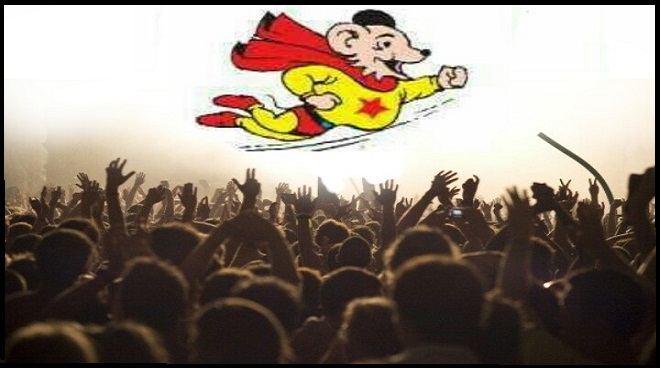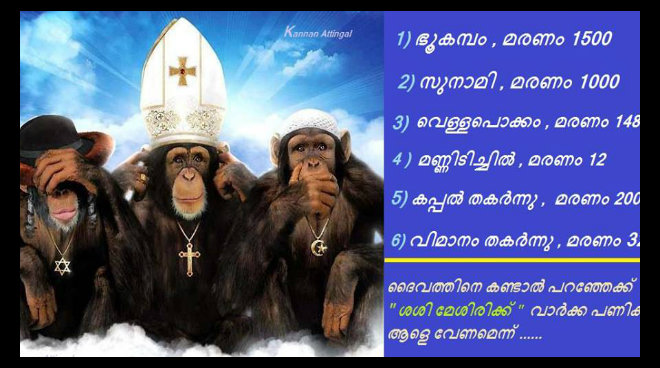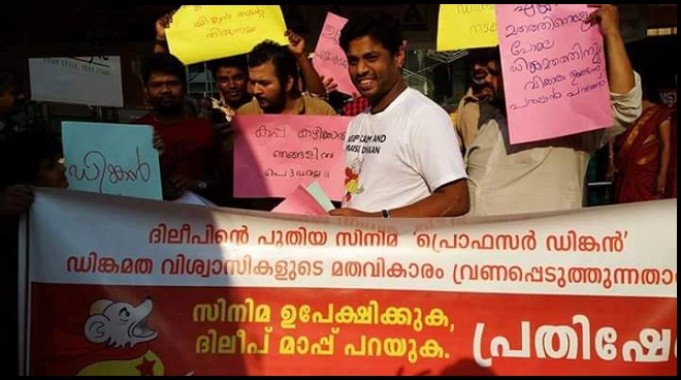A religion born out of new media
The January 30 protest against the upcoming film called 'Professor Dinkan' which hurts the religious sentiments of Dinkoists. Pix courtesy: Nikhil
“The horror of death a chicken feels before death causes hormonal imbalance in the person eating it. Here is the solution. Tickle the chicken before you kill it uttering ‘Dinkiri Dinka’. The horror hormone doesn’t get secreted when the animal laughs.” Surprised? Dinkoism has got solutions for everything.
The major social media spaces in Kerala are all awash in a new religion: Dinkoism. Fed up with the extreme intolerance levels across the existing religious and political landscape, a group of liberal, secular, young Indians have started worshipping ‘Dinkan’, a mouse that appeared as a cartoon character in Balamangalam, one of the leading children’s comic books.
“There is a massive amount of youth who lost their hope in the existing system of secularism”, says Samoosa Thrikonadhyaya, one of the masterminds behind Dinkoism. “They belong neither to the communal left and nor to the corporate left present in the state. Their quest for an alternative political and religious paradigm comes true with Dinkoism.”

Dinkoism took birth from the vibrant troll culture that rules the Malayali social media scenario, nourished by some of the popular trolling groups on Facebook like ‘ICU’ and ‘Troll Malayalam’. The mouse, as portrayed in the comic strips, comes flying to rescue the suffering animals in his jungle. Wearing yellow attire, red panties on the outside and a shawl on his back, the mouse has become a superhero for children.
Its followers, who call themselves ‘Dinkoists’, have recently shown up in public with a protest against an upcoming Malayalam movie named ‘Professor Dinkan’. Dinkoists organised the protest in front of a hotel owned by Dileep, the lead actor in the movie, saying that the name of the movie ‘hurts’ their religious sentiments. The champions of the new ‘religion’ troll other religions and question their logic through sarcasm. “A political alternative is worthless and ineffective a solution in our (Keralite) context. It needs to be backed by a religion to remain a Pandora’s Box”, says Samoosa.
The major communities of Kerala are conventionally aligned towards certain political parties. At the peak of this communal polarisation in politics, there emerged a new generation of neo-secularists who identified less with their community and more with the political party that the community supported. Jammed between identity and ideology, these people remained unorganised and scattered for a very long time. Dinkoism has emerged as a perfect platform for them to share their views.
There are three kinds of positive audiences for Dinkoism. The first views this movement as a joke and laughs at it. They come up with similar praise of other comic characters and fill the scene with comic worship jokes.
The second group conceives the whole idea as a social and religious satire and trolls other religions and beliefs. These non-believers make use of Dinkoism to question their own religion while religious extremists mock their religious opponents.

The third group – the new media audience - who constitute a very meagre percentage of the whole, understand the potential of the religious and political alternative that Dinkoism represents. They are socially confused citizens who are fed up with the religious clichés and political dramas associated with it. They realise the most influential corporate conglomerate is religion at present, and that their individual philosophies and beliefs are brand tags for marketing their much sought after ‘products’, the salvation, blessings and political views are.
Dinkoists release video strips, interviews and audio clips to propagate their faith, along with Dinka hymns, prayer songs and their Dinka philosophy which mocks the popular mythical reasons that religions substitute for scientific truths.
“Lord Dinkan (ka) rested in the core of universe which is a black hole he dug out of vacuum. Thinking of how to kill the time, the Lord realised that he hadn’t yet created ‘time’. Suddenly there happened a holy laugh. The black hole exploded and the vacuums witnessed big bang and from there evolved this tiny space bound with time, called world”, says Upabuddha, a senior Dinkoist sage. They even have their own greeting in which people hold their thumbs up and move them saying ‘Dinka Dinka’ with a smile. “Smile and curiosity are the qualities of a Dinkoist.
Mobility and dynamicity are the concepts denoted in this style of greeting. Smile stands for our welcome towards change. Dinkoism is well equipped for changing times and the dynamics of power structure, say the Dinkoists.
Dinkoism is also keen to smash superstitions. They plan to observe a day called ‘Akshaya Jetteeya’ on which people who buy the red panties like the one worn by Dinkan will ‘prosper’ in life – a way of mocking ‘Akshaya Tritiya’ when people buy gold in the belief that it will bring prosperity.
The movement has lakhs of followers on social media. Several pages, groups and communities have come up supporting Dinkoism on Facebook. Film stars, film directors, politicians and even the collector of Kozhikode district posted their ‘faith’ in Dinkoism on Facebook. It seems that people were seeking a platform from which they could challenge orthodoxies and Dinkoism appeared at a perfect time, when social media have almost evolved to be the alternative ‘mass’ media. The prospect of ‘new media’ having praised and revered so much the birth of an alternate religion and the huge popularity it has, can be viewed as the epitome of social media influence in the ‘enlightened’ public sphere Kerala has. Attempts have been made to trace the origin of Dinkoism in the popular ‘Flying Spaghetti Monster Club’ but not limiting itself to the mockery of religions Dinkoism challenges the illogicality of political, cultural and artist communities of Kerala.
Dinkoists have planned their first district level convention at Eranakulam on 28th of Ferbuary 2016. They have by now declared their stubborn stands on the prominent environments issues of the south like the protection of Western Ghats and Athirappilly waterfalls protection. “Western Ghats is a part of the great Pankila forest, Lord Dinkan’s abode. Its protection is a solely a religious need of the believers and we shall fight for it” – they say.
Dinkoism is not a typical “religion” by its nature, but a socio political movement which has adopted a religious mode of operation to remain above questioning. It can be equated to ‘magic realism’ in theatre arts, where the reality is shown in a different unreal background, enabling the viewers to contemplate upon and introspect on their philosophies.
The mileage Dinkoism has acquired on social media, marks a milestone in the growth of Keralite psyche from the shackles of spiritual, religious and political forces, which is very much a positive sign. Dinkoism sets forth counter challenges for every convention and questions every norm. A religion of liberation is a refuge for the atheists as well. Thus, this gets elevated to be a collective social movement breaking all customs. Many a time, random Facebook users of Kerala throw one question at your face - “Who is afraid of Dinkoism?”
Anagha Jayan E is a freelance writer and an MA MCJ student at The English and Foreign Languages University, Hyderabad. Jayan can be contacted at anaghaedamana@gmail.com







